This external universal rechargeable battery pack has 15V or 19V selectable output voltage plus 5V USB port. Made with
high quality
Samsung Li-ion battery cells. Its capacity is 159 Watt-hour. (A typical 6-cell internal
notebook battery capacity is about 49 Watt-hour. A typical 12-cell
internal notebook battery capacity is about 98 Watt-hour)
Technical Specifications
|
Model:
|
AP170
|
|
Capacity:
|
159 Watt-Hour( or 44100 mAh)
|
|
Battery Cell:
|
Samsung Lithium ion
|
|
Colors:
|
Silver
|
|
Chemistry:
|
Li-ion
|
|
Input Charging Voltage:
|
DC 12 - 19V
|
|
Output Voltage:
|
15V/19V + 5V USB Port
|
|
Max. Output Current:
*
|
Max. 5A for 19V, 5A for 15V, 2.1A for 5V USB Port
|
|
Charging time:
|
4-6 hours
|
|
Size:
|
270.00 x 145.00 x 32.55mm
|
|
Weight:
|
1340g
|
|
Power Indicator:
|
4 level LED indicator
|
|
Built-in Protection Circuit:
|
- Over-charge
- Over-discharge
- Over current
- Over temperature
- Short circuit protection
|
|
Included in Standard Package:
|
- Battery x 1 pc
- AC Charging Adapter x 1 pc
- Adapter Power Cord x 1 pc
- DC Car Charging Adapter x 1pc
- Power Cable x 1 pc
|
Max. Output Current:
* This battery actual output current depends the demands from powered device and is variable. It can by any number under rated Maximum current.
Note: There are many different ways to rate a battery capacity on market.
159 Watt-Hour
Capacity is equivalent to 44100mAh
if rated as most external batteries on market.
Battery Capacity Rating: Watt-Hour, or Wh, is a more accurate
unit to show the power capacity than Amp-. Hour (Ah) that was used
before. The Watt-Hour unit means the wattage that the battery can
provide within one hour. 159 Watt-hour (Wh) capacity means the battery
can theoretically last 10 hours if the device it powered only needs 15.9
Watt power. A typical 6-cell
internal notebook battery capacity is about 49 Watt-hour. A typical
12-cell internal notebook battery capacity is about 98 Watt-hour.
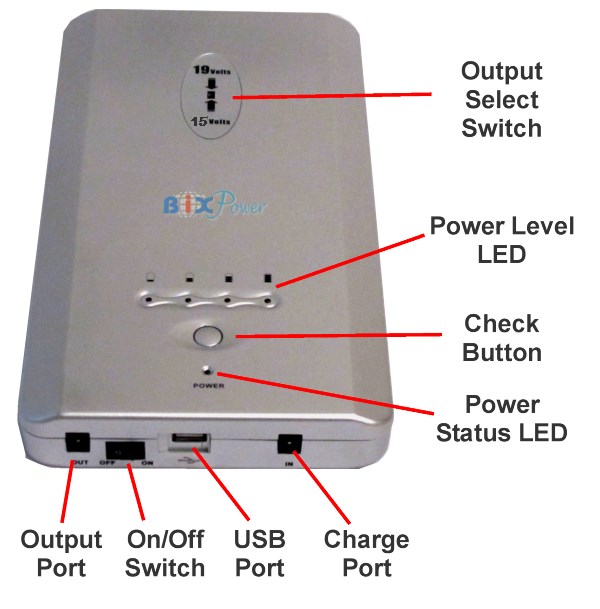
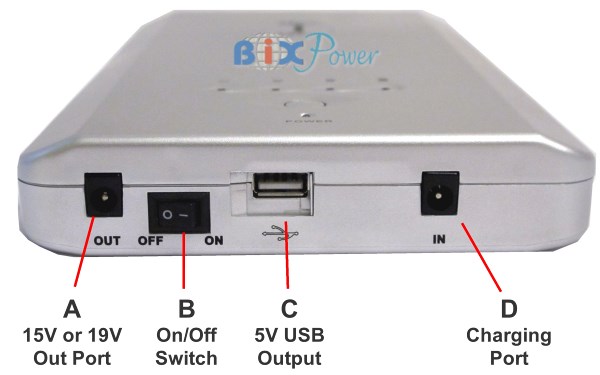
IN -- Battery input port for connecting to battery charger
OUT -- Battery power output port, connect to output cord.
ON/OFF -- This On/Off switch controls output port power.
USB -- Slide the cover to right side, there will be a USB port which outputs 5V DC power
You can
use the 5V USB Port on the battery to charge cellular phone, MP3 player or other
small electronics that can be charged from a 5V USB port. However, the
battery pack does not come with any cable for connector tips for this
USB port. Our optional Z4 cable and connector tips will work with this
5V USB port.
We also offer
optionalVESA Mount Kit to mount this battery to the back of LCD monitors:
Battery Package Contents:
Battery Pack Includes: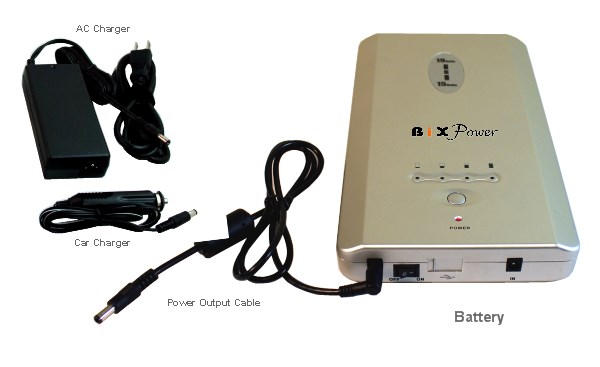
- Battery x 1
- AC Charger & Cord x 1
- DC Car Charger x 1
- Power Output Cable x 1
How this
battery works:
1. Charge the battery: This battery has its own AC battery charger and 12V car charger. You can charge it from any 110V or 220V AC power source or from a car 12V cigarette lighter socket with the 12V car charger. Both the AC charger and the 12V car charger need to connect to the In port of the battery pack.
To quickly charge the battery, we recommend to charge the battery fully while it is not in use.
This battery has specially designed to be able to charge and discharge at same time. However, since each lithium battery has limited charge/discharge cycles ( around 500 times), it is not recommend to use the battery when AC power is available.
2. Set correct output voltage: This battery has a switch to set the voltage output at 15V or
19V. 15V is compatible with 14V~16V, 19V is compatible with 18V~21V.
If your device DC power input requirement is 14V ~ 21V, you can use the output cable to power your device directly from the battery
Out port like this:
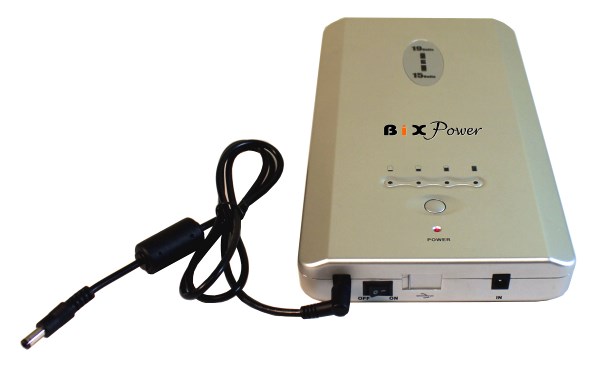
Included with your battery is a output cable
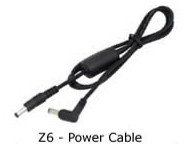
(Click to see details)
The output cable (Z6 Power Cable) one end connect to the battery output port, another end has a 5,5mm/2.5mm connector which will fit a lot laptop notebook computers and other devices.
If the Z6 cable connector does not fit your laptop notebook computers, you can use BiXPower C series connector tips to change it to many different connector tips. C series connector tips may need to purchase separately.
Plug a C series connector tip on the Z6 output cord to form a new size connector like this:
Just that
simple, now you are ready to use it !
Combine 2 ( or more) batteries together to provide more running time:
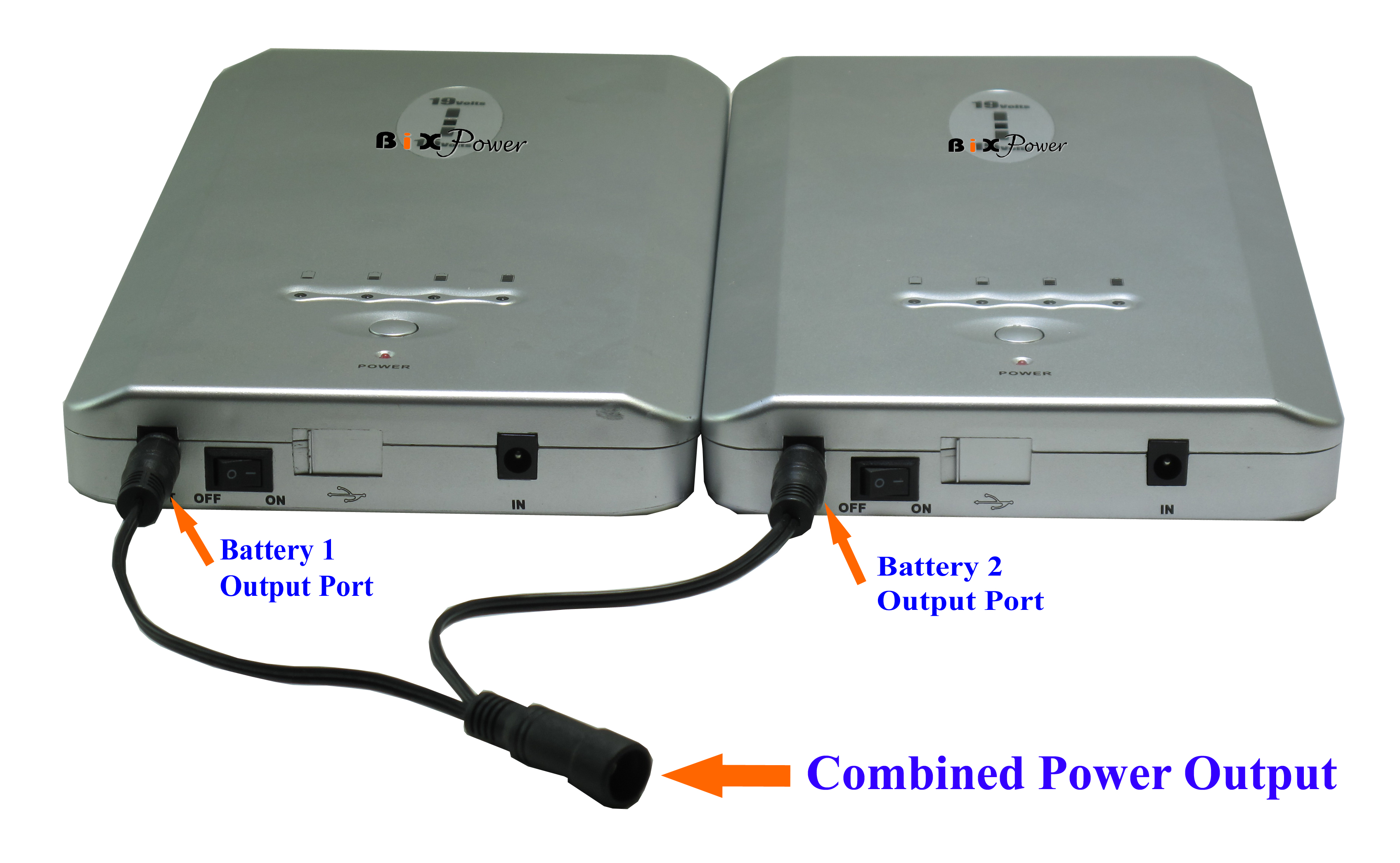
If you need more running time, you may connect 2 batteries together in parallel with BiXPower
Y25 Split Connector :
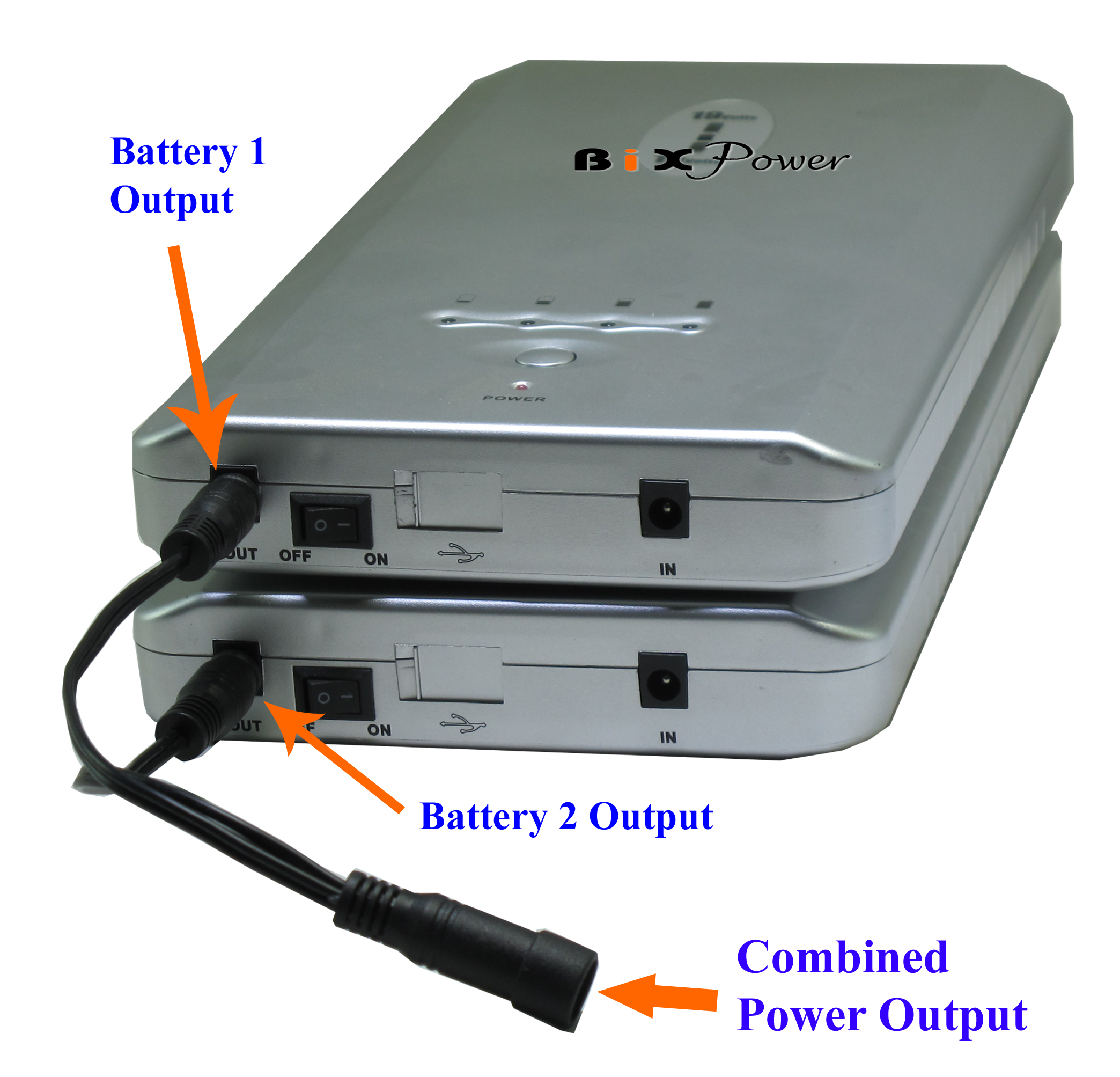
Y25 Split Connector Not Included
Cautions: To link two batteries in this way, please make sure:
1. The output voltage of two batteries is set at same.
2. Any single battery has ability to power the powered device by itself.The purpose of link two or more batteries together is to provide longer running time without interruption. There this no balance control between two batteries . One battery may output more power than another battery and run out of power earlier than another battery. This will not be a problem if a single battery output power is enough to run powered device. However, if the powered device power demand is more than a single battery capability, it may run to problem when one battery run out of power earlier.
Notes: Only a few BiXPower batteries ( such as BP90, BP100, BP160 and BP220 batteries) have been specially designed to allow multi batteries to connect in this way. Other batteries may not be allowed to be connected together in this way (unless specially mentioned).You may also use multi Y25 Split Connectors to Daisy Chain more batteries to provide even more power. Please make sure all batteries output voltages are set at same. Fully charge each battery separately before connect them together.
The battery regular Z6 output cable can fit Y25 connector female end, which will be combined output port in this case. You may use BiXPower
Special Cable with On/Off Switch : which can be used power output cable directly without battery regular Z6 output cable.
Warranty: One Year limited warranty. The one year limited
warranty covers manufacturing and quality defects only. Please note that
batteries wear out with use. The amount of charge a battery can hold
gradually decreases due to usage and aging, which is normal, and this is
not the issue covered by warranty.









